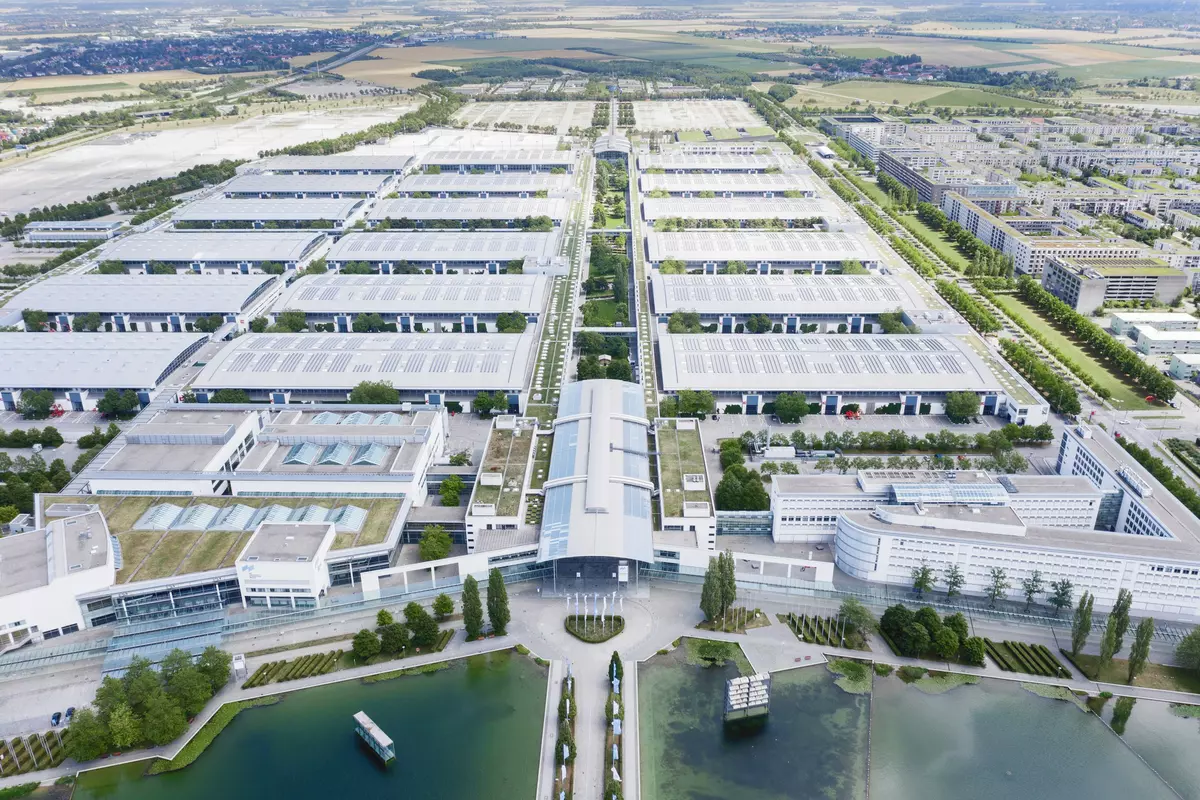Sustainability—paving the way for the future
Sustainable transformation is one of the greatest challenges of our time. This also applies to us as a trade fair company. Messe München embraces its responsibility for the environment and society—a commitment that is an integral part of our corporate strategy.
Three areas of impact
- Corporate sustainability (initiatives) – As part of our company-specific sustainability strategy, we continuously initiate new projects and implement measures throughout the company. We contribute to securing the long-term economic success of the Messe Munich trade fair by doing our part to protect the climate and the environment and by assuming social responsibility. This also includes promoting a value- and future-oriented corporate culture.
- Sustainable trade fairs/guest events – At our own events, we focus on sustainable event management and implement respective measures. We support our guest organizers in making their events more sustainable by providing the necessary infrastructure and flexible services.
- Sustainability on our industry platforms – With our curated areas, a diverse conference program and guided tours, we offer platforms to present and exchange industry-specific sustainable innovations and trends. With our “bgreen Leaders” network, we bring together sustainability decision-makers from various industries and inspire new partnerships.
Specific measures taken to make Messe München more sustainable
Since moving to its new exhibition grounds in 1998, Messe München has been a pioneering force in sustainability, featuring a cutting-edge architectural design and one of the world’s largest and longest-running photovoltaic roof systems.
Under its sustainability program, Messe München is continuously implementing targeted sustainability measures to ensure that it continues to meet its corporate sustainability goals in the future. This includes a continued transition to carbon-neutral energy sources and the ecological enhancement of the exhibition grounds, as well as a focus on topics such as the avoidance and disposal of waste.


At the beginning of 2020, Messe München switched to using electricity generated exclusively from renewable sources and thus took a further step towards carbon-neutral and sustainable trade fairs. In previous years, more than half of the company's electricity requirements had already been covered by renewable sources. This full transition to green electricity saves approximately 6,400 tons of carbon emissions annually during normal operations. The new exhibition halls C5 and C6, as well as the Conference Center North, are heated by district heating, most of which is derived from geothermal energy. And the company is currently planning a further, step-by-step conversion of its heat supply to CO₂-neutral sources.
The photovoltaic system on the roofs of the row of B exhibition halls contributes to the supply of green electricity on the exhibition grounds. At the time of their commissioning in 1998, it was the world's first photovoltaic rooftop system with a peak output of over 1 megawatt—it remains to be one of the largest in the world to this day.
Using solar energy allows Messe München to avoid the emission of approximately 1,600 tonnes of carbon dioxide per year that would be produced by burning fossil fuels to generate electricity.

Even the construction of the exhibition center was based on a sustainable concept, which has been continuously optimized through a variety of measures since it began operating in 1998. With the help of a catalog of sustainability measures that is updated annually, Messe München defines how it will continue to meet its high sustainability standards in terms of its buildings and logistics.
220,000 square meters of green space, some 2,500 trees, green hall facades and 35,000 square meters of green roofs—the grounds of Messe München are green in the truest sense of the word. Decentralized parking and logistics areas for visitors to leading international trade fairs such as bauma even serve an ecological purpose: landscaped as ecologically valuable and species-rich rough grassland with trees, they serve 98 percent of the time as a local recreation area for the population. The new additional parking and logistics area currently under construction will benefit the region’s efforts to protect nature and the environment thanks to its ecological upgrades and a green bridge connecting it to the existing area.

While waste is a major challenge for events, the careful use of resources has a significant impact on CO₂ reduction.
Ideally, no waste should be produced in the first place. Avoiding waste is therefore a top priority for Messe München. Close cooperation with exhibitors is essential, which is why the company has developed a set of waste prevention guidelines for exhibitors (and their stand builders) offering recommendations on how to avoid waste at trade fairs and reduce CO2 emissions.
By revising its waste management strategy at the same time, Messe München is seeking to ensure that the remaining waste is recycled to a greater extent and that waste is properly recycled and disposed of in a resource-friendly manner.
A look behind the scenes
As part of the social media series Sustainability@Messe München, employees share first-hand insights into Messe München’s sustainability efforts, some of which date back more than two decades. You can watch the clips here:
Industry-focused dialog on sustainability at our trade shows
Messe München’s portfolio includes many trade fairs with a strong focus on sustainability issues. Thanks to their international presence, they contribute to the exchange of information and knowledge across industries worldwide.


With the aim of promoting solutions for a sustainable future, Messe München, together with CIRCULAZE, the impact initiative for the circular economy, has launched bgreen leaders. This sustainability network operates across industries and seeks to provide companies, start-ups and investors with a cross-sector platform for networking and collaboration, to present their initiatives in the field of ecological sustainability and to encourage change.
Learn more about bgreen leadersTrade fairs with a focus on sustainability issues
IFAT

OutDoor by ISPO

EXPO REAL

Being a good neighbor
As part of its commitment to social sustainability, Messe München is keen to promote good neighborly relations. The company regularly supports social projects through employee initiatives and donations. In 2023, for example, Messe München employees joined forces with the new Riem municipal library and took part in the nationwide Read Aloud Day by reading to children in Riem in several languages. Donations were also made to support projects by the ECHO youth center, the Riem bicycle repair shop and a STEM project at the school in Lehrer-Wirth-Straße.
Joining forces for sustainable development
Sustainability requires shared commitment. The highly ambitious UN Sustainable Development Goals can only be achieved, if all economic players work together. Messe München wants to make its contribution and therefore supports the work of various initiatives and associations by way of commitments and memberships.

Following common goals and sector-wide collaboration
Messe München is a signatory to the Net Zero Carbon Events (NZCE) Pledge. The companies of the industry initiative committed to the goal of making the international event industry climate-neutral by 2050. They are supported in their efforts the international industry association ufi and the German association AUMA. Messe München participates in the relevant working groups of the industry associations and the NZCE.
Since 2014, Messe München has also been a member of fairpflichtet, the sustainability codex of the German-speaking event industry, as part of which it regularly updates its sustainability profile.


Cross-industry exchange to ensure credible and effective sustainability
As the first trade fair company to join, Messe München became the 700th member of the German Federation of Sustainable Business (BNW) at the beginning of 2024. This organization actively fights greenwashing with its large network of member companies that have made sustainability a core part of their business. Read the BNW press release here.
Acknowledgment, added value and diversity in the professional world
...these values enjoy a high priority at Messe München, as evidenced by its signing of the Diversity Charter in 2024, an employer initiative to promote diversity in companies and institutions. Among other things, Messe München contributes to the initiative’s work with its Proud network, which was founded in 2023.


